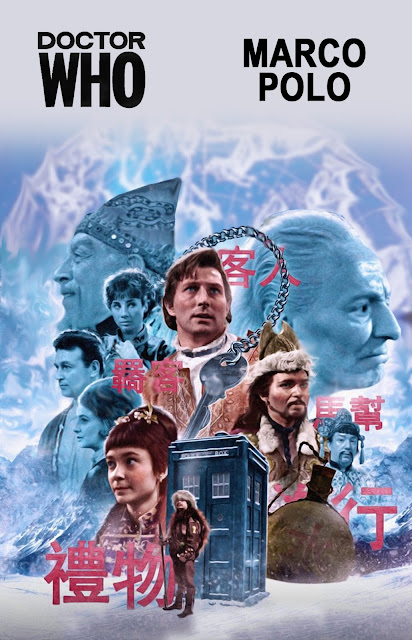Marco Polo [3.9]
Marco claims the TARDIS for the great Kublai Khan, hoping to use it to gain his freedom. If they are ever to win it back, our intrepid travellers must accompany them on their road-trip through medieval China to the imperial city of Peking. Thus begins an epic tale that is tragically missing in its entirety, and now only available as a reconstruction.
The Majesty
First up, this works brilliantly as a human story. The characters are excellent, especially Marco Polo, Tigana and Kublai Khan. Each is a fully rounded character and thus totally believable. Even the walk on parts, such as Wang-lo (the fussy hotelier) or Kuiju (him with the eye-patch and the monkey!) are more than just plot devices and are genuinely entertaining.
Also, the sheer length and breadth of this story sets it apart from a typical Dr Who adventure. The TARDIS crew spend more than a month travelling over 4000km from the plain of Pamir in modern Tajikstan across to Beijing (Peking) by the Pacific Ocean. As the Muppets pointed out, the fastest way to travel is by map, and the caravan does exactly that. These animated sections, with Marco Polo’s journal as a voiceover, are brilliant transitions between the various set pieces.
The design of the show is breathtakingly beautiful – the costumes, props and sets are magnificent, making it all the more frustrating that the footage is missing and we are only left with stills.
The Misery
There are a few logical gaps, which could do with a bit of explanation. Why do Ian and Barbara wander about on the Himalayas looking for fuel, when there is a TARDIS full of junk that they can set on fire? (One of the Doctors old armchairs, perhaps?) Why do they all nearly die of dehydration when there is a well set up ‘water machine’ inside the TARDIS? (I’m assuming it’s after his experiences here that the Doctor decided to install the TARDIS swimming pool?) Why does Marco Polo not look inside the TARDIS? Why doesn’t Tigana kill everyone a thousand times over on the journey? Why does he wait till he is surrounded by the Khan’s guards before revealing his treachery?
The greatest misery is simply that the show is missing. It’s one of the biggest holes in the Who collection.
Magical Moments
- The CGI version I was watching included a sequence in episode 2 where, after Ian and Barbara realise Susan and Ping-Cho are missing in a sand story, they then stand awkwardly in the tent, looking around at the ceiling and the floor shouting “Susan! Susan!”
- At the end of episode four, Ian cuts his way out of the tent with a fruit knife. He approaches a guard, about to (presumably) stab him in the eyeball, when he discovers he is already dead. Great episode ending!
- Hearing the TARDIS has been stored in the stables, the Doctor furiously imitates the hotelier’s voice. “ ‘I couldn’t leave it in the Hanging Gardens, could I?’ - What does he think it is, a potting shed?” Great line, Doctor!
- During the backgammon game, Kublai Khan asks the Doctor what he currently owes him. The Doctor replies smugly “Thirty-five elephants with ceremonial bridles, trappings, brocades and pavilions; four thousand white stallions; twenty five tigers and the sacred tooth of Buddha.” (I imagine the Doctor like some sort of futuristic Noah herding these thirty five ceremonial elephants into his TARDIS. And what exactly he plans on doing with Buddha’s tooth is anybody’s guess!)
Representation
Inevitably there are concerns about racism in a 60s BBC story set in Asia. It’s certainly a shame that all the characters are played by white people, and the story would undoubtedly be stronger if Chinese or Mongol actors had played their respective roles. Similarly, the fact that Marco is a white goodie and Tigana is an Asian baddie is not ideal representation. However, Kublai Khan is an Asian goodie, and Tigana is not just a thug – he is a complex human character, and all in all, viewed as a piece of it’s time, I feel it unnecessary to get on a high horse about this serial.
In Summary
There’s an innocence about this story that works brilliantly in the context of first season Dr Who. There’s no aliens (if we discount the disputable appearance of a yeti in episode one – I’m not convinced!), there’s no masterplans, there’s no grand villainy – there’s only ordinary people caught up in history and making choices, good or bad. It’s a lovely human drama, and while the plot meanders along, that fits its ‘road trip’ genre perfectly.
Overall: 3.9*
[NB: I don’t make allowances for it being missing here. I am grading the recon I saw. So giving this 3.9 means I would rather watch the recon of Marco Polo than the surviving footage of any of the previous stories.]

Comments
Post a Comment